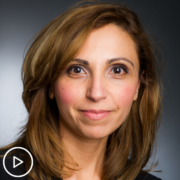Expert Perspective | New and Emerging Progress in Lung Cancer Treatment
Expert Perspective | New and Emerging Progress in Lung Cancer Treatment from Patient Empowerment Network on Vimeo.
What’s the latest in lung cancer research? Dr. Thomas Marron from the Tisch Cancer Institute at Mount Sinai Hospital discusses the advances in targeted therapy and immunotherapy and what this progress means for patients with lung cancer.
Dr. Thomas Marron is Director of the Early Phase Trials Unit at the Tisch Cancer Institute at Mount Sinai Hospital. Dr. Marron is also Professor of Medicine and Professor of Immunology and Immunotherapy at the Icahn School of Medicine at Mount Sinai. Learn more about Dr. Marron.
See More from EVOLVE Lung Cancer
Related Resources

Advances in Targeted Lung Cancer Treatments | What You Should Know |

Antibody Drug Conjugates for Lung Cancer | Advances in Research |

Lung Cancer Treatment Plan Advice | Where Do Clinical Trials Fit In? |
Transcript:
Katherine Banwell:
Dr. Marron, you’re a leading researcher in the field. What new and emerging progress in lung cancer care are you excited about?
Dr. Thomas Marron:
So, there’s many extremely exciting, targeted therapies that’re in development. And so, as I mentioned, we do genetic sequencing, and we get three to 500 genes’ worth of data. But we only have drugs to target around 10 of those.
So, hopefully in the coming years, in the next three to five years, we’ll have many more options based on somebody’s genetic profile of their tumor. I think that also, within the field of immunotherapy, which typically are given to patients who don’t have those targetable mutations.
Immunotherapy is really, has revolutionized the treatment of lung cancer and with immunotherapy, we’re actually able to cure a subset of patients while in the past, we always said patients with metastatic disease had incurable disease, but it was treatable disease, just not curable.
Now, we are curing a subset of patients. Unfortunately, we’re not curing the majority of patients. But the field of immunotherapy is evolving very quickly with new therapies targeting new parts of the immune system.
So, similar with targeted therapies, it’s really an umbrella term. So, targeted therapy is an umbrella term for dozens of different drugs. Immunotherapy, similarly, is an umbrella term for dozens of different approaches to the immune system. So, dozens of different ways to turn on the immune system so that the immune system does its job and recognizes and kills cancer. Because your immune system is in your body to tell the difference between foreign things like COVID and normal things like your lung.
And cancer is somewhere in between and there’s probably hundreds of different ways in which cancer finds an ability to hijack our immune system and then turn our immune system off. And so, I think with these emerging therapies that we’re developing now and will be further developed in the next five to 10 years, I think we’re going to see another revolution happen in the setting of immunotherapy.
Katherine Banwell:
So, what do these advances mean for non-small cell lung cancer patients?
Dr. Thomas Marron:
So, in non-small cell lung cancer, immunotherapy has really changed the way that we’re treating patients from 10 years ago when we were giving chemotherapy alone, or maybe 15 years ago. Ten or 15 years ago, when I saw a patient with metastatic disease, I would have to have a very frank conversation with them and tell them that the median survival was 10 months and that this was an incurable illness that would eventually take their life. Now, with the introduction of immunotherapy, patients are living more than twice as long on average.
And there are a subset of patients, somewhere between 10 to 20 percent of people that go into remission and stay in remission. And so, that really has revolutionized the treatment. Obviously, we’re not done, because we still have to help the remainder of those patients and our goal is 100 percent cure. But the fact that we’re even using the C-word, cure in our cancer clinics is really amazing.










